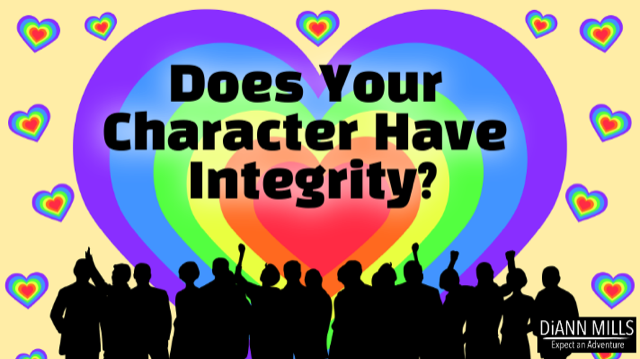
Will the protagonist continue their high-principled lifestyle, or will they choose the easy path of selfishness and become an antagonist?
Anne Frank: “Human greatness does not lie in wealth or power, but in character and goodness. People are just people, and all people have faults and shortcomings, but all of us are born with a basic goodness.”
What does integrity mean to your character? How is that trait established and shown throughout your story? Integrity applies to those who value and practice honesty and strive in every way to practice strong moral and ethical principles. Characters with integrity are unwavering in a persistent quest to live their beliefs in public, with family and friends, and when no one is watching.
A protagonist has faults and weaknesses, but this character respects and works hard to adhere to integrity. When the character fails, she learns from her mistakes and establishes means to progress.
Integrity provides a facade for those characters who seek to hide their activities and motives. Antagonists may display integrity to manipulate others, but within their fiber lies selfishness, greed, and a propensity to dishonesty for personal gain.
The writer uses honesty and righteous standards to enhance the characterization of a protagonist or an antagonist. What is missing in a character’s life speaks louder than what is told to the reader.
Characters who insist upon integrity are credible. They do not need to wear a psychological mask. They are genuinely who they say they are. An antagonist can offer appreciable traits, but his actions pave the way for a positive or negative outcome.

Is the protagonist able to avoid a confrontation that results in angry explosions, hurtful words, and sometimes violence? This aspect of integrity could be a flaw to assist in growth and change. Antagonists use both calm attitudes and temper flare-ups to get what they want, while protagonists strive to avoid those characteristics.
Patience is a virtue, a trait an honorable character seeks to emulate. Antagonists, depending on their goal in the scene, may choose patience to move forward on their less than stellar goals.
Love for oneself and others, even the unlovable, demonstrates a character’s integrity. Kindness, forgiveness, the ability to apologize, solid listening skills, and respect for others’ opinions, beliefs, culture, occupation, and time are positive traits, although the practice can be difficult.
Humility is not what a character claims to have, but what others see in them. A character who believes they are humble—isn’t. This is a big distinction between a protagonist who struggles to overcome a pride issue and an antagonist who views pride as an asset.
A character with integrity embraces honesty in all their dealings with other characters. While that sounds easy … think about the last time you told a small lie, either to spare feelings, to make yourself look good, or to avoid uncomfortable consequences. Our characters experience the same issues. Dishonesty takes a vital role in omitting truth for whatever reason. Practicing honesty is noble, but it’s not a simple endeavor. Antagonists find it impossible to hold up the banner of honesty or false display of integrity continuously.
Trustworthy characters stand on reliability and responsibility. If a protagonist commits to doing something and discovers the action is impossible, the reason is powerful, believable, and most likely not the character’s fault. Protagonists will feel bad and do their best to make up for the problem. Antagonists practice opposition for a selfish reason, making them unworthy of trust.
Characters with integrity understand concentrated effort is needed to meet virtuous objectives. The process is not a race but a journey. Along the way, faults and weaknesses are uncovered.
Will the protagonist continue their high-principled lifestyle, or will they choose the easy path of selfishness and become an antagonist?

Does your character have integrity?
Learn more about this topic in The Art of Exploring Character (Bold Vision Books, 2020) by DiAnn Mills
DiAnn Mills is a bestselling author who believes her readers should expect an adventure. She is a storyteller and creates action-packed, suspense-filled novels to thrill readers. Her titles have appeared on the CBA and ECPA bestseller lists; won two Christy Awards; and been finalists for the RITA, Daphne Du Maurier, Inspirational Readers’ Choice, and Carol award contests. DiAnn is a founding board member of the American Christian Fiction Writers, a member of Advanced Writers and Speakers Association, Mystery Writers of America, and International Thriller Writers. DiAnn continues her passion for helping other writers be successful. She speaks to various groups and teaches writing workshops around the country. Connect with DiAnn on her various social media platforms here: www.diannmills.com

